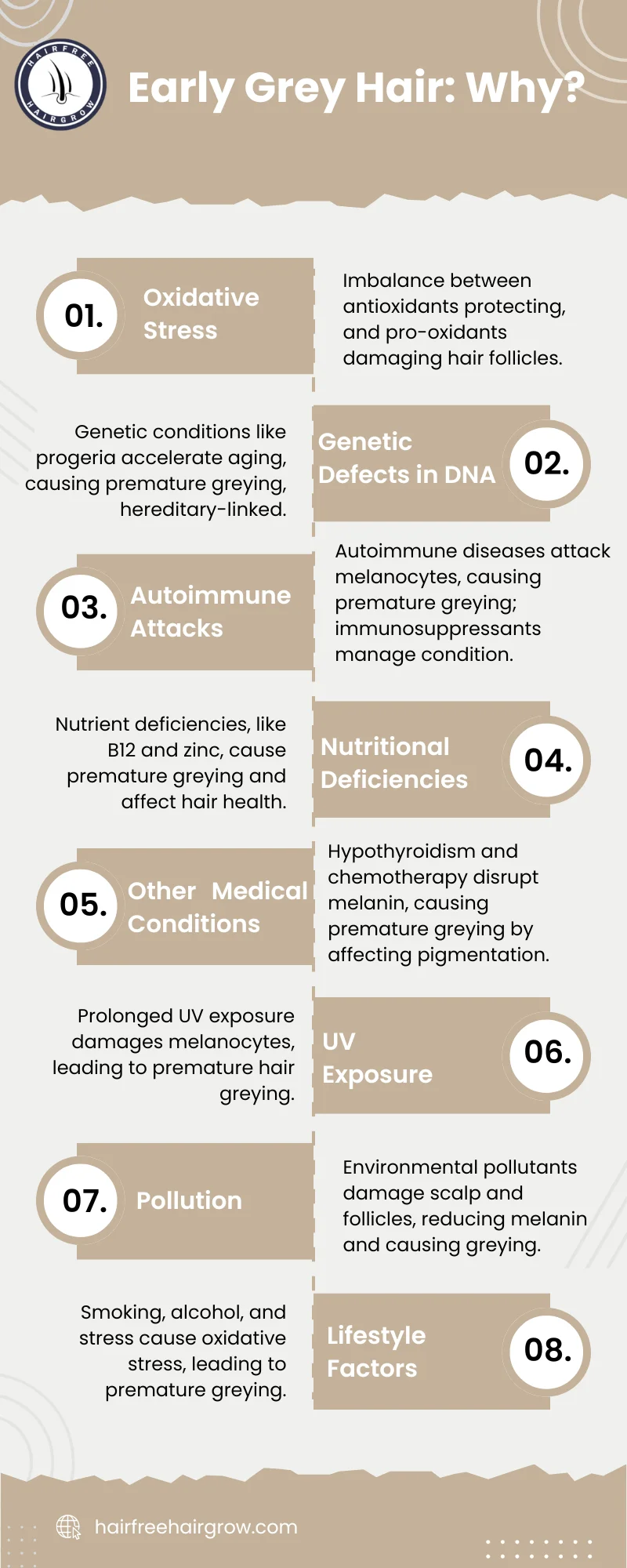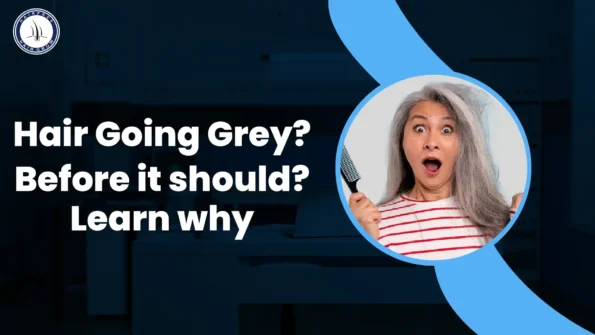Premature Hair Greying (PHG) is a growing concern for many, as individuals begin to notice their hair turning grey as early as their early 20s. This phenomenon can be distressing, not only for aesthetic reasons but also because it might signal underlying health issues. Once a hair strand turns grey, it stays that way, and attempting to pluck it can cause permanent damage. Interestingly, grey hair often grows faster than pigmented hair, making it more noticeable. Discover why hair grey early, its causes, and simple ways to prevent it.

Causes of Premature Hair Greying
Premature hair greying can be caused by a combination of endogenous (internal) and exogenous (external) factors. Here’s a detailed look at both:
Endogenous Causes
Oxidative Stress
Oxidative stress results from an imbalance between antioxidants and pro-oxidants in the body. Antioxidants like catalase and sulfoxide reductase help protect the hair follicles, while pro-oxidants like serum ferritin and whole blood reduced glutathione can damage them. A thorough medical examination, including blood tests, can help identify this imbalance.
Genetic Defects in DNA
Certain genetic conditions, such as progeria or pangeria, can accelerate aging and lead to premature greying. These conditions are often hereditary, making family history a key factor in diagnosing the cause.
Autoimmune Attacks
Autoimmune diseases occur when the body’s immune system mistakenly attacks healthy cells. In the case of premature greying, autoantibodies might target the melanocytes, the cells responsible for producing hair pigment. Treatment with immunosuppressants can help manage this condition.
Nutritional Deficiencies
Deficiencies in essential nutrients like Vitamin B12, Vitamin D, copper, iron, calcium, and zinc can lead to premature greying. These nutrients are crucial for hair health and pigment production.
Other Medical Conditions
Conditions such as hypothyroidism or side effects from chemotherapeutic drugs can disrupt melanin production, the pigment responsible for hair color, leading to greying.
Exogenous Causes
UV Exposure
Prolonged exposure to ultraviolet (UV) rays can damage hair and skin cells, including the melanocytes, contributing to premature greying.
Pollution
Environmental pollutants can affect the scalp and hair follicles, potentially leading to a reduction in melanin levels and premature greying.
Lifestyle Factors
Smoking, excessive alcohol consumption, and stress are well-documented causes of premature greying. These factors can lead to oxidative stress and disrupt the body’s natural balance, affecting hair pigmentation.
Addressing Premature Hair Greying
If you’re experiencing premature greying, it’s essential to consult a healthcare professional to determine the underlying cause. Early intervention can help manage the condition and potentially prevent further greying.
Visit HairFree and HairGrow for Expert Solutions
At HairFree and HairGrow, we specialize in treating hair-related issues, including premature greying. Dr. Kiran Chotaliya, one of the best hair transplant surgeons in Pune, leads our team of experts. We offer consultations and treatments tailored to your needs, ensuring the best care for your hair health.
- We are located in Surat, Pune (Pimple Gurav), Pune (Kharadi), Hyderabad, Ahmedabad, Kolkata, Indore, Bhopal, Delhi (Gurugram), Nagpur, Mumbai, Vapi (Silvassa), Bangladesh.
- For Consultation, Please Call/WhatsApp on: 7272832222
Conclusion
Premature greying is not just a cosmetic issue but can indicate more severe health concerns. Understanding the causes and seeking timely medical advice can help manage and mitigate the condition. Remember, early diagnosis and hair treatment are crucial for maintaining your hair health and overall well-being.
Written By
MD (Skin & VD)
Dr. Chintan Bhavsar is a leading hair specialist with expertise in understanding why hair grey early. With personalized care and advanced treatments, he helps patients manage premature greying, offering solutions to maintain healthy, youthful-looking hair through expert diagnosis and effective therapies.
Disclaimer
We’ve made all possible efforts to ensure that the information provided here is accurate, up-to-date and complete, however, it should not be treated as a substitute for professional medical advice, diagnosis or treatment. See Detailed Disclaimers Here.



